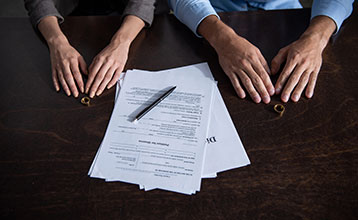Alimony refers to the legal obligation of one spouse to provide financial support to the other spouse or ex-spouse. This obligation arises from a divorce or family law. Alimony is different from child support, which refers to a parent’s obligation to provide for their children by paying the other parent for their maintenance and support.
The word alimony comes from the Latin word alimonia, meaning “sustenance.”
Different countries use different terms when referring to financial “sustenance” between spouses or ex-spouses. Some use the term maintenance or spousal maintenance or support, whilst alimony is commonly used in the U.S.
In the United States, alimony is governed by The Uniform Marriage and Divorce Act. However, the determination of alimony differs significantly from state to state. Each state has its own laws or guidelines on the amount and duration of an alimony order. Some states will only award alimony if the marriage lasted for a certain number of years. Other states limit the duration of alimony to the length of the marriage. States like California and New York leave the duration and amount of alimony to the court’s discretion.
In Singapore, alimony is governed by the Women’s Charter and is generally referred to as spousal maintenance.
Like U.S. law, alimony or spousal maintenance is not automatically ordered in every divorce in Singapore.
How does the court in Singapore award alimony?
Whether the court will order spousal maintenance will depend on the circumstances of the case. The court will only make a maintenance order if it is practicable and fair in the circumstances.
The overarching principle when deciding on spousal maintenance is financial preservation. Financial preservation typically means that the wife is maintained at a standard that is reasonably similar to the standard of living she enjoyed during the marriage.
When deciding on the amount and duration of maintenance in Singapore, the court will consider the factors set out in sec 114 of the Women’s Charter.
Section 114 includes the following factors:
- the income, earning capacity, and financial affairs of each party to the marriage, now and in the foreseeable future;
- the current and foreseeable future financial needs, obligations and responsibilities of each party;
- the standard of living enjoyed by the family before the divorce;
- the duration of the marriage and the age of each party;
- the physical and mental abilities of each party;
- the contributions made by each party to the marriage to the welfare of the family; and
- the value of any benefit the party will lose due to the divorce, for example, a pension.
It should be noted that financial preservation does not always mean being in the exact position the parties would have been if they didn’t divorce. In VPU v VPT [2021] SGHCF 11, the court stated clearly that the parties need not be in the exact same financial position after the divorce. The court said, “the reality of divorce is that both parties will have less money than they had during the marriage.” This is similar to U.S. courts’ approach in that both spouses might have to make life and work changes after divorce.
In ATE v ATD [2016] SGCA 2, the court also made it clear that it is not the husband’s duty to be a “general insurer of sorts.”
What is nominal maintenance?
In some cases, the wife might be financially independent at the time of the divorce but want to ensure that she can ask for maintenance if something happens in the future. In Singapore, the court cannot alter or increase maintenance in the future if there is no maintenance order to start with. Even a nominal order of S$1 leaves the door open to approach the court in future to vary and increase the maintenance if needed.
The court will not automatically order nominal maintenance. The wife must present evidence of why she should be entitled to a nominal maintenance order. As said in ATE, maintenance is not intended to create life-long dependency on the former spouse.
Certain states in the U.S. recognise nominal alimony. It is seen as a “space preserver,” allowing the receiving party to apply for a variation of the order if needed in the future. The court could also award nominal alimony in a situation where the paying spouse’s circumstances might improve to the extent that it could warrant paying alimony to the receiving spouse.
Who can claim alimony in Singapore?
This is one of the significant differences between alimony in the U.S. and spousal maintenance in Singapore. In the U.S., alimony has been gender-neutral since the late 1970s. Both husband and wife can claim alimony since the US Supreme Court declared unequal treatment of men and women unconstitutional in Orr v Orr 440 U.S. 268 (1979).
Until recently, only the wife was entitled to maintenance in Singapore. Since the 2016 amendments, an exception was created to allow incapacitated husbands to claim maintenance from their wife or ex-wife.
An incapacitated husband is a husband who was or became incapacitated before or during the marriage, by any physical or mental disability or illness, preventing them from earning a livelihood. He cannot maintain himself and continues to be unable to support himself financially.
Sec 113 (1) of the Women’s Charter allows incapacitated husbands to claim maintenance from their wives. The court will consider the same sec 114 factors when considering the application for maintenance.
Are there other types of alimony in Singapore?
Yes, maintenance also applies to children of the marriage. In Singapore, each parent has the same duty to maintain their children. This duty remains after divorce or remarriage.
If a parent refuses or neglects to pay reasonable maintenance for a child who cannot provide for themselves, the court can order the parent to pay monthly maintenance for the child. Child maintenance can also be ordered as a once-off lump sum.
Who qualifies for child maintenance?
Sec 92 of the Women’s Charter defines a “child of the marriage” as children of the husband and wife under 21 years old. It includes adopted children and any other child who was a member of the family before the divorce (whether or not a child of the husband or the wife).
Not all countries include stepchildren in the duty to pay maintenance. In most U.S. states, a person is only responsible for child maintenance of one’s own biological or legally adopted children. Some states, however, would order maintenance to support stepchildren.
Most U.S. states generally do not expect parents to pay child support after the child turns 18. Usually, child maintenance in Singapore only ends when the child turns 21. However, the court may order child maintenance to carry on in certain circumstances.
Section 69(5) of the Women’s Charter states that maintenance can be ordered for a child older than 21 years old if the child:
- has a mental or physical disability;
- is serving full-time national service;
- is still studying or receiving training for a trade, profession, or vocation; or
- other special circumstances justify a maintenance order.
How will the court determine the amount of child maintenance in Singapore?
There is no prescribed formula to determine child maintenance. The court will consider the factors set out in sec 69(4) of the Women’s Charter when deciding on the amount:
- the financial needs of the child;
- the age of the parents that could affect their ability to earn an income;
- the earning capacity, if any, of the child and the parents;
- any physical or mental disabilities of the child;
- contributions made by each parent to the welfare of the family;
- the standard of living enjoyed by the child;
- the manner in which the child is expected to be educated or trained; and
- any relevant conduct of the parents.
Divorce in Singapore is complex. It might be particularly stressful if you are a foreigner living in Singapore and unfamiliar with the law and terminology. Although the courts may consider similar factors when determining maintenance or alimony, there are significant differences between jurisdictions worldwide.
Singapore might have a different approach to alimony than your home country. Therefore, it is crucial to seek legal advice as soon as possible if you are considering a divorce in Singapore.


